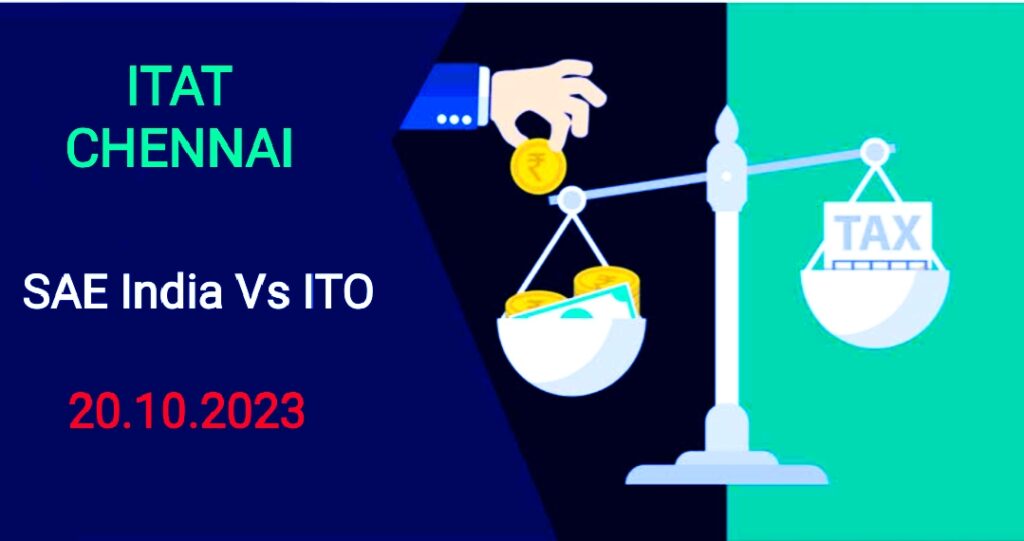Exemption U.S.11 Cannot Be Granted When Trust Activities Are Commercial
In a recent ruling concerning Section 11 of the Income Tax Act, 1961, the Income Tax Appellate Tribunal (ITAT) Chennai bench emphasized that exemptions cannot be granted when the activities of a trust closely resemble trade, commerce, or business. This significant ruling sheds light on the crucial interplay between tax exemptions and the nature of a trust’s operations.
Facts of the Case
SAE India, a taxpayer registered under Section 12AA of the Income Tax Act, 1961 since AY 2004-05, submitted its income tax return on 30.09.2013, declaring a ‘NIL’ income. However, the case came under scrutiny by the department. The Assessing Officer (AO) observed that the taxpayer’s objectives fell under the last category of ‘charitable purpose’ defined in Section 2(15) of the Income Tax Act.
Prior to the Assessment Order issuance, the taxpayer argued that the Society was established to advance education in Mobility Engineering. Various educational initiatives, including technical meetings, workshops, seminars, and programs designed for society members, were organized, all aligning with the scope of education per Section 2(15) of the Income Tax Act. Despite these contentions, the AO rejected the claims, denying the exemption under Section 11 of the Act.
Unsatisfied with this decision, the assessee appealed to the Commissioner of Income Tax (Appeals) [CIT(A)], and the appeal was granted in favor of the assessee. Following this, the revenue filed a second appeal before this tribunal.
Submission of the assessee representative
Additionally, Mr. Sridhar asserted that the assessee diligently organized a spectrum of activities, such as technical meetings, workshops, seminars, and diverse educational programs, all aimed at advancing the profession of mobility engineering. According to him, these initiatives seamlessly fall within the defined scope of ‘education’ as stipulated in Section 2(15) of the Income Tax Act.
Submission of the Counsel of Revenue
In this context, entities like trade promotion bodies, councils, associations, or organizations are unambiguously classified as GPU charities and are subject to the regulations outlined in Section 2(15) of the Income Tax Act. Consequently, if the activities of these GPU charities involve trade, commerce, or business for a fee or cess, the respective Trusts or Societies would be ineligible for exemption under Section 11 of the Income Tax Act.
Judgement of ITAT Chennai
The tribunal further noted that the assessee falls under the final category of the ‘charitable purpose’ definition as outlined in Section 2(15) of the Act, specifically covering any other object of General Public Utility (GPU). However, it was emphasized that the Trust’s objectives and activities tread into the territory of trade, commerce, or business, falling under the provision specified in Section 2(15) of the Income Tax Act. Therefore, the eligibility for the assessee’s exemption must be evaluated considering both gross receipts and those derived from trade, commerce, or business activities.
If the gross receipts from General Public Utility (GPU) activities, particularly from trade, commerce, or business, exceed 20% of the total gross receipts, the assessee would not qualify for exemption under Section 11 of the Income Tax Act. In the current assessment year, the gross income from organizing conferences surpassed this threshold, leading to the conclusion that the assessee is not entitled to exemption.
After conducting a thorough scrutiny of the pertinent facts and records, the two-member bench, comprising Manjunatha. G (Accountant Member) and Manomohan Das (Judicial Member), decisively concluded that the grant of exemption under Section 11 of the Income Tax Act is not warranted when the activities of the trust manifest a commercial nature, encompassing elements of trade, commerce, or business.
Conclusion
This pivotal determination underscores the tribunal’s commitment to ensuring adherence to the stipulations laid out in the Income Tax Act. It serves as a noteworthy precedent, emphasizing the nuanced evaluation required when considering tax exemptions for trusts engaged in activities that lean towards the commercial spectrum. Stay informed about such crucial legal perspectives by exploring our comprehensive coverage of tax-related matters.
Case Title: SAE India vs ITO: Citation: ITA Nos.3144 & 3158/Chny/2018; Date of order: 20.10.2023
Note: Definition of “Charitable Purpose” U/S.2(15) of Income Tax Act
In accordance with Section 2(15) of the Income Tax Act, 1961, the term “charitable purpose” encompasses a variety of noble causes such as the relief of the poor, education, yoga, medical relief, preservation of the environment (including watersheds, forests, and wildlife), and the safeguarding of monuments, places, or objects of artistic or historic significance. Additionally, it includes the promotion of any other objective of general public utility.
However, it’s crucial to note that the advancement of any other object of general public utility may not be considered a charitable purpose if it involves engaging in activities akin to trade, commerce, or business. This applies particularly to activities that entail providing services related to any trade, commerce, or business for a fee, regardless of how the income generated is utilized.
There are exceptions to this rule:
(i) The said activity must be carried out in the actual pursuit of the advancement of any other object of general public utility.
(ii) The total receipts from such activities in the previous year should not surpass twenty percent of the total receipts of the trust or institution undertaking these activities in that specific year.
To Read about Taxation of Charitable Trust CLICK HERE
To Read the Ruling of ITAT Surat on Validity of Revision Order CLICK HERE
Also Read
CBDT Notification No. 94/2023 Dt. 31 October 2023: Form ITR-7 Changed for FY 2022-23
Faceless Assessment under Income Tax Act 1961: A Comprehensive Guide

